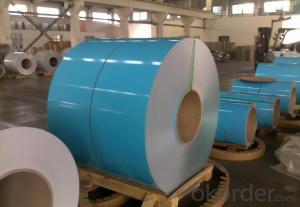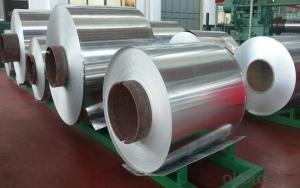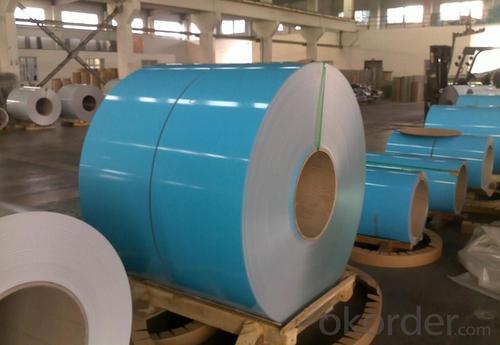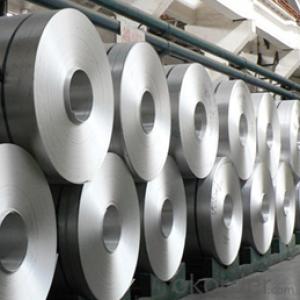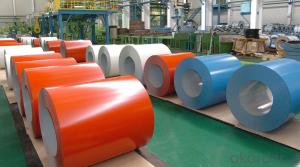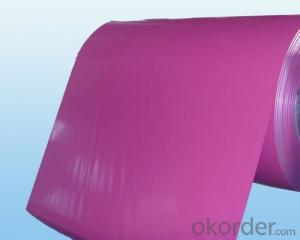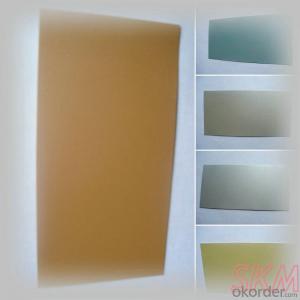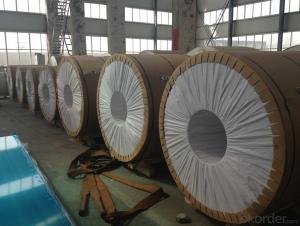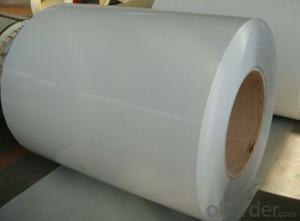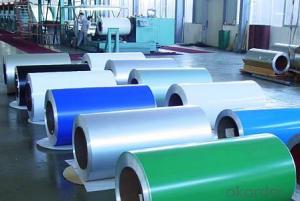Prepainted Aluminum Coil for Sale - Color Coated Aluminum Roll for Glass Curtain Wall Frame
- Loading Port:
- Shanghai
- Payment Terms:
- TT OR LC
- Min Order Qty:
- 2 m.t.
- Supply Capability:
- 50000 m.t./month
OKorder Service Pledge
OKorder Financial Service
You Might Also Like
Specification
Color Coated Aluminium Roll For Glass Curtain Wall Frame
Specifications
Grade | 1050,1060,1070, 1100, 1200, 2024,3003, 3004,3005, 3105, 5005,5052 5182,5754,8011 etc |
Thickness | 0.1~1.5mm |
Width | 100~2500mm |
Surface Treatment | PVDF and PE coated |
Temper | O-H112 |
Hardness | More than 2H |
Yield(≥MPa) | 160 |
Ultimate Strength(≥MPa) | 175 |
Elongation(≥%) | 6 |
Packing Material | Moisture-proof agent, steel tape bundle, wooden pallet, brown paper |
Method | Vertical(eye to sky) or horizontal(eye to wall) |
Standard Specification | 1000mm×C, 1200mm×C, etc |
Shipping | Container Loading or Bulk Pack |
Characteristics
1) Excellent weather-proof durability
2) Anti-ultraviolet
3) High erosion resistance
4) Stable color and gloss
5) Good mechanical processing performance
6) Abrasion resistance
7) Anti-impact
8) High flexibility
Coating varieties
Polyester Coatings (PE)
PE (polyester) coatings exhibit an excellent combination of hardness, flexibility, flow, appearance, and superior resistance to dirt retention in indoor and outdoor applications. These coatings are highly resistant to abrasion, metal marking, staining, and marring, and require minimal maintenance. Glazetech uses polyester paints which provide excellent colour and gloss retention properties.
Polyvinylidene Fluoride Coatings (PVDF)
PVDF (polyvinylidene fluoride) is a chemical resistant thick film barrier coating commonly used in architectural applications where both excellent appearance and substrate protection must be maintained over a long period of time. This coating is unaffected by most chemicals and solvents and has excellent wear and abrasion resistance. PVDF also has a high dielectric strength, excellent resistance to weathering and the ability to self extinguish.
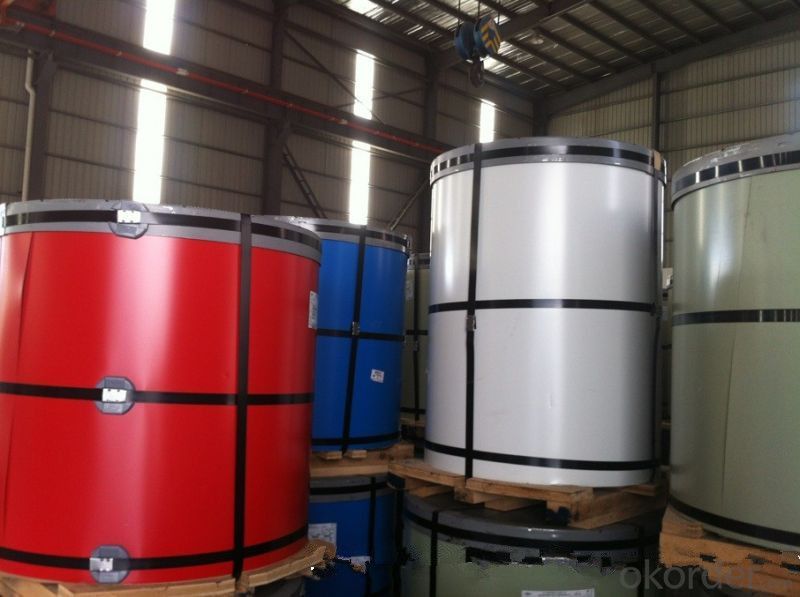
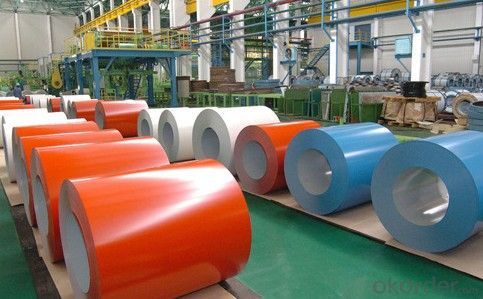
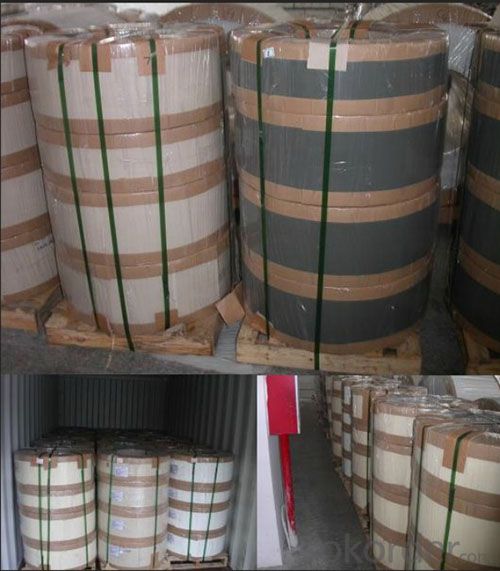
FAQ
--Q: Do you provide free samples?
--A: Yes, free samples will be sent to you on freight at destination.
--Q: Can I get your latest products catalogue?
--A: Yes, it will be sent to you in no time.
--Q: What is the MOQ?
--A: 2 tons
--Q: What are your payment terms?
--A: We accept L/C, T/T.
--Q: What kinds of alloy can you supply?
--A: 1000 series: 1050, 1060, 1070, 1100, 1145, 1200
3000 series: 3003, 3004, 3105, 3104
5000 series: 5052, 5083, 5754, 5182
6000 series: 6061, 6063, 6062, 6063
8000 series: 8011, 8021
--Q: What’s the coating of top side?
--A: PVDF and PE coating
--Q: What kinds of temper can you supply?
--A: O-H112: O,H12,H14,H16,H18,H22,H24,H26,H,32,H34,H111,H112, T3, T4, T6
- Q: what language did Aluminum and Uranium originate from ? Who or what were they named for ?
- The ancient Greeks and Romans used alumen (alum, potassium aluminium sulfate, K2Al6(OH)12(SO4)4) in medicine as an astringent, and as a mordant in dyeing. Alum was exported from ancient Greece and Italy. In 1761 the French chemist Louis-Bernard Guyton de Morveau (1737-1816) proposed the name alumine for the base in alum. Guyton de Morveau was instrumental in setting up a standardised system for chemical nomenclature and often collaborated with Antoine Lavoisier, who in 1787, suggested that alumine was the oxide of a previously undiscovered metal. In 1808, Sir Humphry Davy (1778-1829) did experiments for the decomposition of alumine, silex, zircone, and glucine. He failed to isolate the metals in these, as he reported in his paper for the Royal Society of London on 30 June 1808, but he suggested names for the metals (note) Cf. Silicium, Zirconium, and Beryllium (Glucium) Thus he proposed the name alumium for this still undiscovered metal and later agreed to change it to aluminum. Shortly thereafter the name aluminium was adopted to conform with the -ium ending of most elements. Uranium was named by its discoverer German chemist Martin Klaproth, after the last planet to have been discovered Uranus.
- Q: What are the thermal conductivity properties of aluminum coils?
- Aluminum coils have high thermal conductivity properties, which means they are efficient in transferring heat.
- Q: How are aluminum coils used in the production of furniture and fixtures?
- Aluminum coils play a crucial role in the production of furniture and fixtures, particularly in the manufacturing of lightweight and durable pieces. These coils are typically made from high-quality aluminum alloys, which offer excellent strength-to-weight ratios and corrosion resistance properties. One common application of aluminum coils in furniture production is in the creation of frames for chairs, tables, and other seating arrangements. The lightweight nature of aluminum makes it easier to handle and transport, while still providing the necessary structural integrity. Aluminum coils can be easily formed, welded, and assembled into various frame designs, allowing for flexibility in creating different furniture styles. Additionally, aluminum coils are often used in the production of fixtures such as cabinets, shelves, and display racks. These coils can be cut, shaped, and bent to create customized components that fit specific design requirements. The corrosion resistance of aluminum ensures that these fixtures can withstand exposure to moisture, making them suitable for both indoor and outdoor settings. Moreover, the use of aluminum coils in furniture and fixture manufacturing provides benefits beyond their physical properties. Aluminum is a highly recyclable material, making it an environmentally friendly choice. It also offers cost-effectiveness due to its durability and low maintenance requirements, reducing long-term expenses for both manufacturers and consumers. In summary, aluminum coils are integral to the production of furniture and fixtures due to their lightweight, durable, and corrosion-resistant properties. Their versatility allows for the creation of various designs, while their recyclability and cost-effectiveness make them a preferred choice in the industry.
- Q: Dongying power plant with 0.6mm thick insulation aluminum coil, manufacturers can be divided into small volumes?
- Tolerable。 The price depends mainly on what you need to split into.
- Q: What are the different surface protection options available for aluminum coils?
- There are several surface protection options available for aluminum coils, depending on the specific requirements and applications. 1. Paint Coating: One of the most common methods of surface protection is applying a paint coating on the aluminum coil. This provides a protective layer that helps prevent corrosion, oxidation, and damage from environmental factors. Additionally, paint coatings can offer aesthetic appeal and come in various colors and finishes. 2. Anodizing: Anodizing is an electrochemical process that creates a durable and corrosion-resistant oxide layer on the surface of the aluminum coil. This method not only enhances the coil's resistance to wear and tear but also provides a decorative appearance. Anodized coatings can be clear or colored, offering flexibility in design options. 3. Film Protection: Applying a protective film on the surface of the aluminum coil is another common option. These films are typically made of plastic or vinyl and provide a temporary layer of protection during transportation, handling, and installation. They safeguard against scratches, abrasions, and other minor damages before being removed. 4. Powder Coating: Powder coating involves the electrostatic application of a dry powder onto the aluminum coil's surface. The powder is then cured under heat, resulting in a durable and resilient protective layer. Powder coatings are known for their excellent resistance to chemicals, UV rays, and physical impacts. 5. Cladding: Cladding, also known as laminating, involves bonding a protective layer, such as PVC, onto the aluminum coil's surface. This method provides enhanced resistance against scratches, impact, and weathering. Cladding can offer additional benefits, such as thermal insulation and noise reduction. These surface protection options vary in terms of cost, durability, appearance, and specific application requirements. It is essential to consider factors such as the intended use, environmental conditions, and desired aesthetics when selecting the most suitable surface protection option for aluminum coils.
- Q: What types of aluminum coil are best suited for specific applications?
- <p>Yes, different types of aluminum coil are better suited for specific applications. For instance, 1100 series aluminum coil, known for its high purity and excellent formability, is ideal for applications requiring deep drawing or bending. The 3003 series is often used for applications needing good corrosion resistance and formability, such as automotive parts and chemical equipment. The 5052 series offers a balance of strength and corrosion resistance, making it suitable for marine applications and aircraft structures. The 6061 series is known for its strength and is often used in construction and transportation industries. Each series has unique properties that make it more suitable for certain applications, so selection should be based on the specific requirements of the project.</p>
- Q: I want to make arrows for my bow that making, i have an idea of making a wooden mold and then finding the melting point of aluminum foil and melt it, prob is that i dont have anything to melt it with my moms oven goes up to only 500F and i need one up to 1240F
- The wooden mold will not be able to handle the molten Aluminum. You will need a foundry in order to melt down the aluminum properly, and some shop equipment to cut the arrows out of the mold. It would take an inordinate amount of aluminum foil to make an arrowhead anyway. Typically you want to melt down aluminum that is higher quality (old aluminum doors for instance). Anyway, try taking a class in foundry, it will teach you what you need to know. Do you have such a class in your High School or local community?
- Q: What are the potential applications of pre-painted aluminum coils?
- Pre-painted aluminum coils have a wide range of potential applications in various industries. They are commonly used in the construction sector for roofing and cladding purposes due to their durability, corrosion resistance, and aesthetic appeal. Additionally, they can be found in the transportation industry for manufacturing automotive parts, such as body panels and trim. Other potential applications include signage, electrical enclosures, and appliances, where their lightweight nature and ability to withstand harsh conditions make them an ideal choice.
- Q: What are the fire-resistant properties of aluminum coils?
- Aluminum coils possess excellent fire-resistant properties due to their high melting point, which is approximately 660 degrees Celsius or 1220 degrees Fahrenheit. This makes them less likely to ignite or contribute to the spread of fire. Additionally, aluminum's low flammability and ability to dissipate heat quickly help to minimize the risk of fire-related accidents.
- Q: * How is hitting with a aluminum Wiffle Ball feel and work out?* Did you like the results you had hitting with a aluminum Wiffle Ball bat?
- I did her like this I did her like that I did it with a wiffle ball bat
Send your message to us
Prepainted Aluminum Coil for Sale - Color Coated Aluminum Roll for Glass Curtain Wall Frame
- Loading Port:
- Shanghai
- Payment Terms:
- TT OR LC
- Min Order Qty:
- 2 m.t.
- Supply Capability:
- 50000 m.t./month
OKorder Service Pledge
OKorder Financial Service
Similar products
Hot products
Hot Searches
Related keywords
